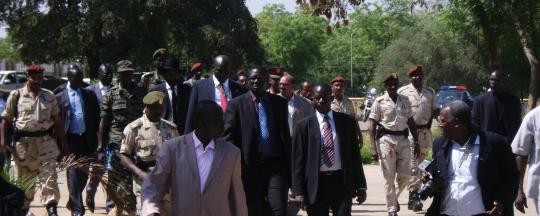The South Sudanese president speaking to a crowd of army officers made his first reported remarks on a rumored coup plot. His speech yesterday at the army headquarters, reported by Sudan Tribune, suggests that a drama in the shadows played out last week out of the public eye.
No details have emerged as to who might have been involved in the plot or how far it might have progressed. That a serious plot even existed cannot be confirmed – but President Salva Kiir’s speech suggests, at the very least, that the top leadership fears ongoing unrest in the army and within the top tier of the government.
The presidential convoy was seen yesterday traveling to Bilpam headquarters on the outskirts of Juba, ahead of Kiir’s speech to army officers. The convoy included several heavily armed army vehicles carrying members of the president’s Tiger guard force.
In his remarks Tuesday delivered at Bilpam, Salva Kiir linked the coup plot to rebels in Jonglei and also to discontent among hardliners from Northern Bahr El Ghazal who have opposed withdrawing elements of the SPLA 5th Division from the Samaha area along the Darfur border.
Kiir implicated only one commander in the alleged plot, Maj. General Simon Gatwec Dual, who has been jailed. The general was deputy director for production at Bilpam headquarters, giving him a portfolio within management of the army’s extensive economic holdings and activities. However, an unnamed intellectual from the detained general’s Lou Nuer community told Sudan Tribune that the general was used as a scapegoat to explain ‘the unknown’.
Fears of a coup had already hit Juba after the Independence Day celebration in July. It was said at that time that the plotters were the ‘Garang Boys’, a term used loosely to define close loyalists of the late SPLA founder John Garang, who was periodically estranged from Kiir in the years before his death in 2005.
In mid-July this year it emerged that the deputy head of military intelligence, Major General Mac Paul, had been arrested and detained at a military prison in Yei. A handful of other senior officers including two colonels, Garang Deng and Alfred Sebit, were also arrested. Additional road barricades went up on roads near the presidential palace. These have yet to be removed though traffic is permitted to flow through them.
Kiir was in Uganda last week for the celebration of the country’s independence jubilee. His vice president, Riek Machar, was also abroad in America visiting the United Nations headquarters.
In his speech yesterday, Kiir reportedly was at pains to suggest that the country’s concessions at the Samaha (i.e. ‘Mile 14’) border strip, which is occupied by the 5th Division, are not a permanent concession but rather a temporary security arrangement. He also warned that coup plotters, even if they succeed, would be isolated internationally.
Sudan Tribune also reports that the defense minister and army chief of staff, John Kong Nyuon and James Hoth Mai, were both with Kiir in Kampala when news of the coup attempt reached them. The army at the time was under the charge of deputy minister of defence and veterans affaires, Majak Agoot.
South Sudan’s military numbers around 140,000. Since the peace agreement with Khartoum in 2005, it has grown by tens of thousands by absorbing formerly independent or hostile militias. The military in recent years has remained active in engagements against insurgents in the Upper Nile region in particular, as well as clashes with the Sudan Armed Forces along the northern frontier. The South Sudan army receives training and support from the United States military at both headquarters and field levels, and for special forces assigned to track the Lord’s Resistance Army.
Photo by Radio Tamazuj: Kiir and Bashir with entourage in Juba, January 2012




